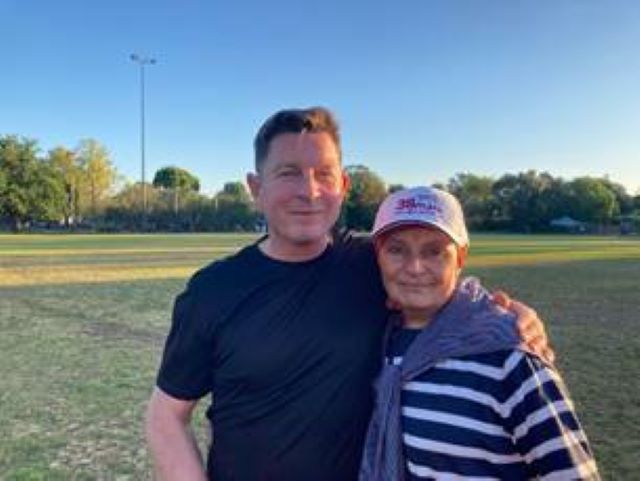
By Mikayla van Loon
Eastern Palliative Care (EPC) is a little over a week away from its first ever fun run Pound the Pavement.
The community fundraising event is coming to Lillydale Lake on Sunday 9 October to support the in-home end of life care service in each of its programs.
Human Resources, Volunteer Services and Communications manager Peita Carroll said in years past EPC had taken part in Run Melbourne but decided to go down a different path for 2022.
“We found during Covid, when [Run Melbourne] was pushed out to your own suburb, people preferred that and they preferred not to go into the city,” she said.
“So rather than tag on to someone else’s fun run we decided to try our own so that we could fundraise for ourselves and make it a more community type event rather than a commercial event. So for us, this is a community event as well as a fundraising event.”
Having reached the target amount of $20,000 and with over 200 people registered for the event, Ms Carroll said the interest and support has been incredible, as well as widespread.
“The interest has been fantastic. We’ve got some of our own staff and volunteers coming along but we’ve got a lot of external people,” she said.
“We’ve got local businesses involved. We’ve got a couple of local politicians coming along. We’ve got people who have had a loved one in our program and are doing this in memory of that person. Families getting together as groups and coming along.”
Ms Carroll said EPC covers 130 suburbs across eastern Melbourne, an area of almost 2000 square kilometres which can see nurses and family support workers drive about 75,000 kilometres per year.
“Our specialist palliative care service visits people in their own homes, because that’s where they want to be for their end of life care.
“It’s really important that we can honour their wish of wanting to be at home as much as possible for as long as possible and a lot of people want to die at home these days, they don’t want to be in a hospital or a hospice.”
The ability to visit people in their homes, whether “they live in a house, an aged care facility, or a caravan or a shed”, Ms Carroll said is what makes EPC so special.
For bereaved carers like Rob and Annree Ormsby, who allowed Mr Ormsby’s mum Krystyna to stay at home in the last six months of her life, would “not have been possible without the unwavering support and guidance from the Eastern Palliative Care (EPC) team”.
“Our decision to engage and embrace Eastern Palliative Care’s Stay at Home Program early and fully, was in hindsight the single smartest thing we did,” Mr Ormsby said.
“From the very beginning, EPC provided committed, professional, and heartfelt services and support.
“The nurses guided us with compassion and understanding, navigating Mum’s personal needs and fears, along with the family dynamics throughout the ‘phases’ of the illness up to her dignified, peaceful death at home.”
Mr Ormsby said throughout every part of his mum’s late-stage cancer diagnosis, EPC was able to offer respite support, family support and guidance.
EPC provides a well-rounded support service from having the appropriate equipment available like hospital beds to regular nurse and carer visits, as well as physiotherapists, masseurs and volunteers to walk dogs, write biographies and do social calls.
“At the heart of what they did for us, was gifting their knowledge and wisdom, giving us the confidence to honour Mum’s wishes, and to just be with her, at home with those she loved,” Mr Ormsby said.
For all the people EPC is able to assist, Ms Carroll said there’s always a worry of funding and an inability to cater for the growing demand of people wanting to die at home.
“A recent analysis conducted by KPMG estimated that three in four, palliative care providers don’t believe they’re going to be able to meet future demand in the current funding setting,” she said.
“So we’re very worried that if we don’t get increased government funding we will not be able to keep up with the cost and the demand of this growing, ageing population.”
Over the last couple of years, Ms Carroll said EPC saw a 20 per cent increase in client numbers which was highly driven by the pandemic.
“During Covid, in particular, people did not want to be in a hospital, they couldn’t have visitors. It was just really difficult.
“There were a lot of people with Covid in hospitals, so people wanted to be at home where they could have family and friends with them and have their pets.”
EPC, like most palliative care services in Victoria, receives basic funding from the State government’s Department of Health but also relies heavily on bequests and donations to provide the essential equipment and services it does.
“The population is going to continue to grow and if funding doesn’t increase then it’s going to be a problem.”
That’s why fundraising events like Pound the Pavement become so important for organisations like EPC.
Although just the inaugural event, Ms Carroll said she expects Pound the Pavement to become an annual event and invites everyone to get involved in some capacity.
“Even if you can’t run or participate in any way, you can still donate to the event and you can still come along on the day if you want and cheer people on.”
To find out more, go to www.epc.asn.au/events






